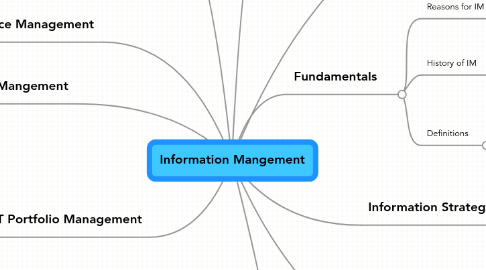
1. architectures in IM
1.1. Roles
1.2. IA-Development framework
2. IT Portfolio Management
2.1. Aims
2.2. Evaluation Methods
2.2.1. Risk analysis
2.2.2. Benefit analysis
2.2.3. Information Strategy fit
2.2.4. Architecture & infrastructure fit
2.2.5. Operational urgency analysis
2.2.6. Dependency analysis
2.3. stakeholders
2.4. Maturity Model
2.5. Barriers and contributors
3. IT Programme Mangement
3.1. Definition
3.2. Roles
3.3. New node
4. IT Service Management
4.1. What is ITSM?
4.2. Service and SLA
4.3. yet another maturity model
5. Project Management
5.1. fundamentals
5.2. Stages
5.2.1. Initialization
5.2.1.1. Making business case
5.2.1.2. Appoint prj.manager
5.2.1.3. Determine project organization
5.2.1.4. Key stakeholder analysis
5.2.1.5. signed project charter
5.2.2. Planning
5.2.2.1. Work breakdown structure
5.2.2.2. Dependency graphs
5.2.2.3. Planning HR
5.2.2.4. Planning/Controlling Costs
5.2.2.5. Procurement/sourcing (outsourcing?)
5.2.2.6. reporting/communications/marketing
5.2.3. Implementation
5.2.4. Completion
6. Fundamentals
6.1. Reasons for IM
6.1.1. Information society/economy
6.1.2. 6 decisions IT staff shouldn't make
6.2. History of IM
6.2.1. Paperwork reduction act
6.2.2. Nolan's Stages Theory
6.3. Definitions
6.3.1. Information Infrastructure
6.3.2. Information function
6.3.3. Information Management
7. Information Strategy
7.1. strategy in general (MBV/RBV)
7.2. What is IS
7.2.1. Functional
7.2.2. application portfolio
7.2.3. enumerative lists
7.2.4. system of plans
7.3. our definition of IS
8. IS Planning
8.1. IS Planning Process
8.2. Planning tools
8.2.1. SLEPT analysis
8.2.2. Five Forces
8.2.3. Value Chain Analysis (internal/external)
8.2.4. Business strategy analysis
8.2.5. CSF analysis
8.2.6. Balanced Scorecard
8.2.7. Application portfolio matrix
8.2.8. Parson's generic ISs
9. IT Outsourcing
9.1. New institutional economics
9.2. agency theory
9.3. Reasons/ determinants for outsourcing
9.4. Modes
9.5. Risks/countermeasures
9.6. pricing models
9.7. outsourcing instances
9.7.1. ASP
9.7.2. BPO
9.7.3. IT Offshoring
